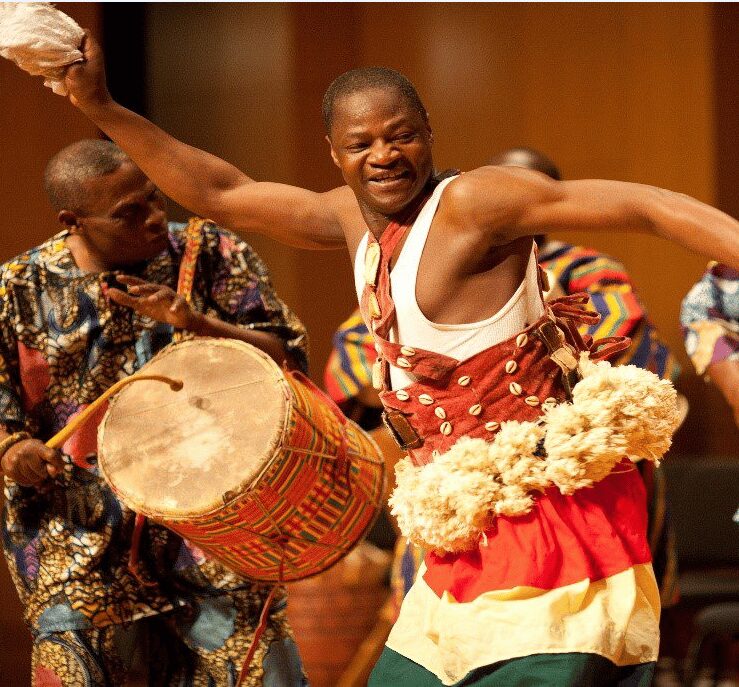Ghanaian music and dance have a rich cultural history that has spanned centuries. Traditional Ghanaian music and dance are deeply rooted in the country’s history and are an essential part of traditional life. These forms of art are also popular globally, with highlife music being particularly influential. Ghanaian music and dance have spiritual and cultural significance and are used to mark important events like weddings, funerals, and festivals. They are also used to communicate with ancestors and the spirit world.
Traditional Ghanaian music is characterized by complex rhythms and polyrhythmic structures that involve call-and-response patterns. Instruments such as the kora, xylophone, and talking drum are widely used. Dance is an integral part of music and is often used to tell stories or convey messages. Traditional dances are performed in a circle or line, with dancers often wearing brightly colored costumes and elaborate headdresses. Many of these dances have religious significance and are performed to honor ancestors or deities.
Modern Ghanaian dance has been instrumental in shaping other dance forms worldwide, including jazz, hip-hop, and contemporary dance. It is a vital part of Ghana’s cultural legacy and a significant contribution to the global artistic landscape. The emphasis on storytelling and the fusion of traditional rhythms and instruments with modern soundscapes make modern Ghanaian dance stand out from other dance forms. It allows the audience to connect with the dancers on a deeper level.
Challenges facing the Music and Dance Industry
The music and dance industry in Ghana is not only a cultural treasure but also a significant contributor to the country’s economic growth. The industry provides jobs for thousands of people, including musicians, producers, managers, and sound engineers, among others. It also attracts tourists and generates revenue through music sales, performances, and other related activities. However, the industry faces several challenges that hinder its development and sustainability.
One of the most significant challenges facing the music and dance industry in Ghana is piracy. Piracy is a widespread problem in the industry, with illegal music downloads and distribution networks significantly affecting the revenue of artists and record labels. The lack of effective copyright laws and enforcement mechanisms exacerbates the problem, making it difficult for musicians to earn a decent living from their craft. This, in turn, undermines the quality and diversity of the music produced in Ghana.
Another significant challenge facing the industry is the lack of royalties for musicians. Ghanaian musicians struggle to earn royalties from their music, which affects their ability to earn a sustainable income from their craft. This problem is further compounded by the lack of effective collecting societies that can adequately represent the interests of musicians and ensure that they receive the royalties due to them.
Limited access to funding is also a significant challenge for musicians in Ghana. Many artists struggle to access funding to produce and promote their music, making it difficult for them to compete in the highly competitive music industry. The limited access to funding also hinders the growth of the industry, as many talented musicians are unable to produce their work due to financial constraints.
Inadequate infrastructure is another challenge facing the music and dance industry in Ghana. The lack of adequate recording studios, performance venues, and marketing channels makes it difficult for musicians to reach their target audience and promote their work. This, in turn, limits the growth and development of the industry, as musicians are unable to fully exploit their creative potential.
Limited opportunities for international exposure are also a significant challenge for Ghanaian musicians. Despite the global popularity of African music, Ghanaian artists face limited opportunities for international exposure, which hinders their ability to reach a wider audience. This is partly due to the lack of effective marketing and promotion mechanisms, limited access to international distribution networks, and the perceived “niche” status of African music genres in the global music industry.
Another challenge facing the music and dance industry in Ghana is the lack of professionalism. The industry is plagued by poor management practices, inadequate contracts, and limited access to legal representation. This, in turn, creates an environment of exploitation, making it difficult for artists to earn a fair income from their craft.
Finally, cultural attitudes towards music and dance in Ghana can also pose challenges to the industry. The lack of support from the government, limited recognition of music as a viable career path, and a focus on traditional music over contemporary genres are just some of the cultural attitudes that can impede the growth and development of the industry.
Summary
Music and dance are essential aspects of the Ghanaian culture, with a rich cultural heritage that spans centuries. Traditional Ghanaian music and dance are deeply rooted in the country’s history and are an essential part of traditional life. Modern Ghanaian dance has made a significant contribution to the evolution and diversity of dance forms globally. It has inspired many dancers and choreographers, leading to new forms and styles of dance. Despite the challenges it faces, modern Ghanaian dance remains an essential part of the global artistic landscape, continuing to captivate audiences with its unique fusion of tradition and contemporary artistry.






































